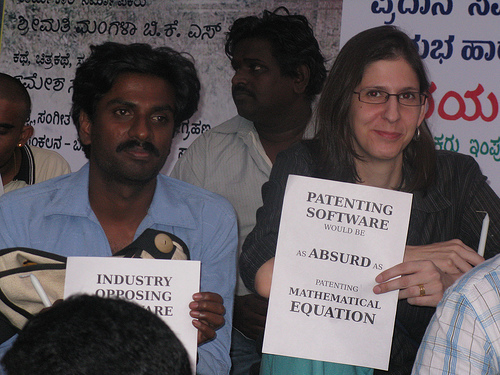Patent Revolt in European Patent Office
- Dr. Roy Schestowitz
- 2008-09-15 22:49:25 UTC
- Modified: 2008-09-15 22:49:25 UTC

Strike 1. The
EPO is having a little new crisis. Its own employees are
demanding a reform and taking it to the streets after reports of unrest and overworked staff.
The international Staff Union of the European Patent Office (SUEPO) has called on the staff of the office to strike on Thursday 18th of September, and to demonstrate in Brussels for a reform of its supervisory board. The strike and demonstration are timed to coincide with meeting in the Belgian capital of the executive of the patent office, under its president Alison Brimelow, to seek approaches to a "strategic renovation". The employee representatives expect around 300 staff members from the patent offices in Munich, Berlin, The Hague and Vienna to attend the protest rally.
The Stop Software Patents campaign has already
taken notice.
According to an EPO internal staff survey of June 2008, only 9% of the EPO examiners believes that "Brimelow and the Vice-Presidents actively promote patent quality". Brimelow is progressing, since Alain Pompidou, the former President, had a trust of only 7%.
But wait. That's not all. The patent system is considered so bad now that it's
compared to natural disasters, urging observers to take appropriate action before it's too late.
The European Patent Office (EPO) is warning of "Global Patent Warming" in light of the growing number of patent applications it is receiving. At the AIPPI (Association Internationale pour la Protection de la Propriété Intellectuelle) Congress that closed today in Boston, EPO head Alison Brimelow said that the increasing number of patent applications is currently the biggest problem that patent offices face and is slowing down the issue of patents.
And it's not just Europe. Oh, no. Australia as well is rethinking the system, having
recently sought feedback from the public. Here is the
report from IAM Magazine.
The Australian government is reported to be considering an overhaul of the country’s patent laws, following the release of a report that identifies the ease of getting protection as a barrier to innovation. The courts in Australia, conclude the authors of Venturous Australia – Building Strength in Innovation (Chapter 7, pages 83 to 87), have “overturned important ‘gatekeeping’ principles of the patent system that existed until the early 1980s”. In particular, they identify software and business methods as an issue, and state that large companies are using the patent system to build thickets that effectively keep competitors out of markets.
Stop Software Patents has
responded to this as well.
A report has been completed. It says, the inventive steps required to qualify for patents should be considerable, and the resulting patents must be well defined, as to mininise litigation and maximise the scope for subsequent innovators. In particular software and business method patenting is an Australian concern.
Lawyers have a natural (and selfish) desire to increase and to cause legal storms. It's profitable.
The Inquirer links to a
Microsoft patent, but attributes it to Nokia. It's another excellent example of junk patents and demonstrates the sad state of the system, overall.
ONE OF the most irritating things about taking photos with a cameraphone is the stupid filenames they're given. Wouldn't it be much better to squiggle something on the back of the pic like you do with prints?
Well, Nokia has decided this would be a jolly good idea and has filed a patent here in the USA for a technique that enables users of cameraphones or digital cameras to scribble 'back-of-photo'
This is not innovation. This is a total fiasco.
We encourage our readers to read
the following older page about Professor Stiglitz, a Nobel prize winner who is also a vocal protester against the patent system.
[T]he US government knew it, charges Stiglitz, at least in the case
of the biggest privatisation of all, the 1995 Russian sell-off. 'The
US Treasury view was: "This was great, as we wanted Yeltsin
re-elected. We DON'T CARE if it's a corrupt election." '
Stiglitz cannot simply be dismissed as a conspiracy nutter. The man
was inside the game - a member of Bill Clinton's cabinet, chairman of
the President's council of economic advisers.
Most sick-making for Stiglitz is that the US-backed oligarchs stripped
Russia's industrial assets, with the effect that national output was
cut nearly in half.
After privatisation, Step Two is capital market liberalisation. In
theory this allows investment capital to flow in and
out. Unfortunately, as in Indonesia and Brazil, the money often simply
flows out.
Stiglitz calls this the 'hot money' cycle. Cash comes in for
speculation in real estate and currency, then flees at the first whiff
of trouble. A nation's reserves can drain in days.
It's slightly political, but it connects several issues and associates 'knowledge monopolies' with wealth.
⬆
